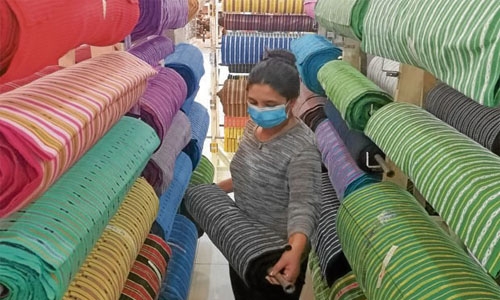Online market fair showcasing Filipino-made fashion and lifestyle products in Bahrain
TDT | Manama
The Daily Tribune – www.newsofbahrain.com
Would you like to see the best Filipino-made fashion and other lifestyle products using traditional and contemporary textiles from different parts of the country?
The Embassy of the Philippines in the Kingdom of Bahrain is inviting the public – citizens and foreign residents – to an exclusive preview and online shopping experience at the Online Fair organised by the International Bazaar Foundation Inc. in cooperation with the HABI Textile Council of the Philippines entitled “HABI KALAYAAN ONLINE FAIR” from 10 to 11 June.
The event, which is a showcase of sustainable fashion and other lifestyle products from the Philippines, aims to bring the community together to showcase locally made products and Philippine culture.
The online fair may be accessed through www.shophabifair.com from 12am on 10 June until 23.59 pm on 11 June.
Culture and art
Since its establishment in 2009, HABI Fair strives to promote the best Filipino-made products from different parts of the country. Bringing Philippine culture and art to the forefront of the lifestyle industry has been its goal for the longest time.
And even in the face of a global pandemic, the Filipino artisans’ fair stays true to that mission. Last year, the fair took a leap as it went digital for the first time.
Weaving enthusiasts and local merchandise aficionados got to see the vibrant Filipino artistry in its new e-commerce site www.shophabifair.com, from Oct. 21 to 27.
Over 30 merchants representing various weaving communities from Luzon, Visayas, and Mindanao showcased sustainable and ethical fashion and lifestyle products at the online market fair. “Since we are not allowed to gather in large groups because of the pandemic, the online edition of the Likhang HABI Market Fair is our way of helping to sustain the local weaving economy,” says HABI president Adelaida Lim.
“We urge our HABI friends to join us in this endeavour.” As many industries are looking at sustainability as a necessary business step to take, they’re are also recognising the importance of the Philippines’ traditional weaving.
Long before textile production has been a commercial business, weaving has been among the many ways Filipino indigenous groups preserve their traditions, centring their craft on sustainability by paying respect to the resources and their ancestors.
Main goal
“There are many beautiful fabrics from the different areas in our country,” says HABI chairperson Maribel Ongpin. “One of our main goals is to make sure that our traditional textiles will still be a part of our modern lifestyle as we transition to the new normal.”
HABI also continues its long-term commitment and advocacy of reviving the use of pure Philippine cotton, a fiber that is very much a part of the Filipino culture.
It has partnered with the Philippine Fiber Industry Development Authority to give local weavers organic cotton seeds and threads for its Cotton Adoption Project to boost its position in the industry.
Related Posts

